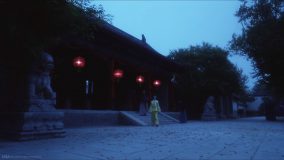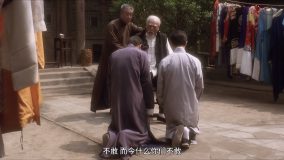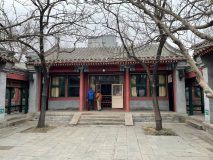FAREWELL MY CONCUBINE, DIR. CHEN KAI GE(1993)
Mei Lanfang Memorial Hall, Haidian District, Beijing

Cheng turned his mind to a woman and left the school. Scene from ‘Farewell My Concubine,’ 1993, directed by Chen Kai Ge.
The film “Farewell My Concubine,” released by Chen Kai Ge, narrates a tragedy about two drama actors who play Peking opera having different values about life and drama. Cheng Die Yi(one of the main characters) was infatuated with the play so deep that he couldn’t distinguish between the play and reality, and he fell in love with his brother, Duan Xiao Lou. Under the feudal society and the great cultural revolution, Cheng eventually went through a difficult life and suicide after the play.
The film was mainly taken in Mei Lanfang Memorial Hall, also known as the former residence of Mei Lanfang(1986). It is the place where Cheng and Duan grew up and learned drama. The conventional Peking courtyard represents the feudal value buried deeply under people’s hearts.
The scene is covered by a gray, murky filter and uses a cool tone to depict the whole space, making the hall a depressing and inhumane place to live. This filming technique transforms an ordinary living space into a cruel, indifferent drama school, which indicates that under the feudal society, how strict teachers were with their students and how hard it was to be a drama player at that time. The dark, murky color in the scene also implies that after endless pain physically and mentally, Cheng finally converted his mind from a man to a woman and lived in the drama for his entire life. However, in reality, the circumstance of Mei Lanfang Memorial Hall is different from the scene. The hall is just a regular, old-fashioned, traditional courtyard where opera master Mei Lanfang lived. It is full of life and also Peking drama. While in the scene, the director Chen uses a dark tone and shoots from a low visual angle to depict the drama school, which puts the audience in the same aspect as the character to feel the depressing and cruelness in this building.

Cheng and Duan were criticized by their teacher. Scene from ‘Farewell My Concubine,’ 1993, directed by Chen Kai Ge.
Apart from this scene, Chen wants to convey more above the tragedy of Cheng through this movie. Chen not only wants to expose the darkness of the feudal society but also wants to satire the foolishness of the people under the great cultural revolution. He also put forward an advanced value of homosexuality in the early 1990s. It can be seen that this is an aggressive film that wants to cover so many elements. Actually, Chen did it. Besides, there were also many metaphors apart from the construction. For example, the sword that Cheng and Duan found in their youth was used throughout the whole film, indicating the film’s central concept, “be loyal to one thing until death,” which is also the picture of Cheng’s entire life. Besides, the lines in the play indicate that Cheng was the accurate Yu Ji, but Duan was the fake Xiang Yu, and Cheng eventually suicide in front of his love just as Yu Ji did 2000 years ago. Due to the ingenious metaphors and sarcasm in the film, “Farewell My Concubine” is undoubtedly the most fantastic film ever in China.


Left: Outside of Mei Lanfang Memorial Hall in Haidian District, Beijing. Right: Inside of Mei Lanfang Memorial Hall in Haidian District, Beijing. Both were taken personally.
-Huai Chengtian(3035845978)
I appreciate that you had done the fieldwork personally, especially taking some photos from a similar angle to Mei Lanfang Memorial in Farewell my Concubine. This is a good start. I would suggest you take advantage of this by making a comparative spatial analysis between the movie and reality. This will better integrate your fieldwork with the film review. In addition, pay more attention to the display of space in the Farewell my Concubine, maybe not that many. Analyzing 2-3 key scenes in detail can make your reflection more profound. For example, the traditional Chinese courtyard where Peking Opera inherited and the indoor scenes where dramatic conflicts took place. In addition, Farewell my Concubine is a film with a long time span, running through the protagonist’s childhood, youth and middle age. How did the filmmaker express the chronological shifts through space? There are still multiple through the lens of film and architecture worthy of examining.